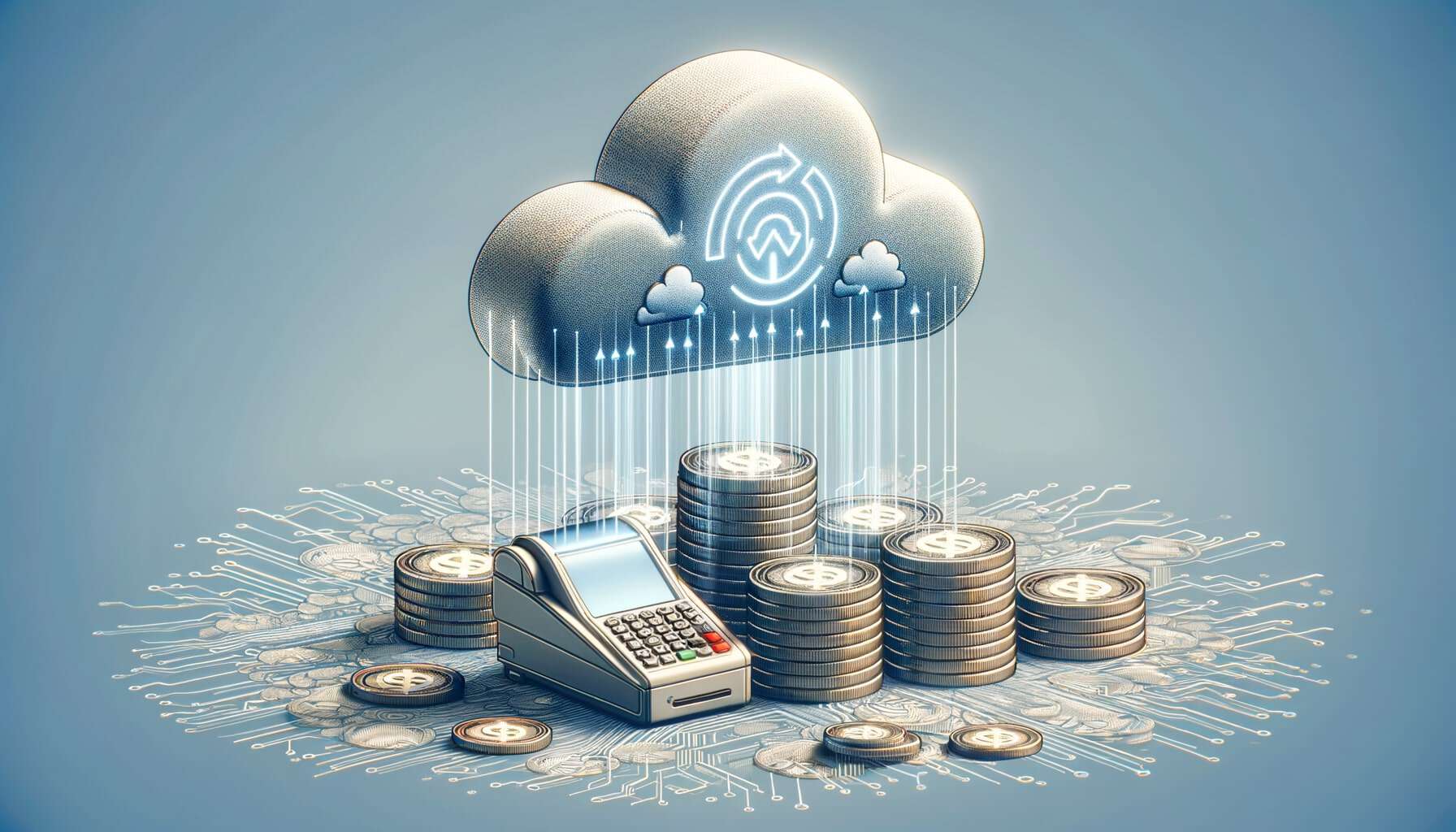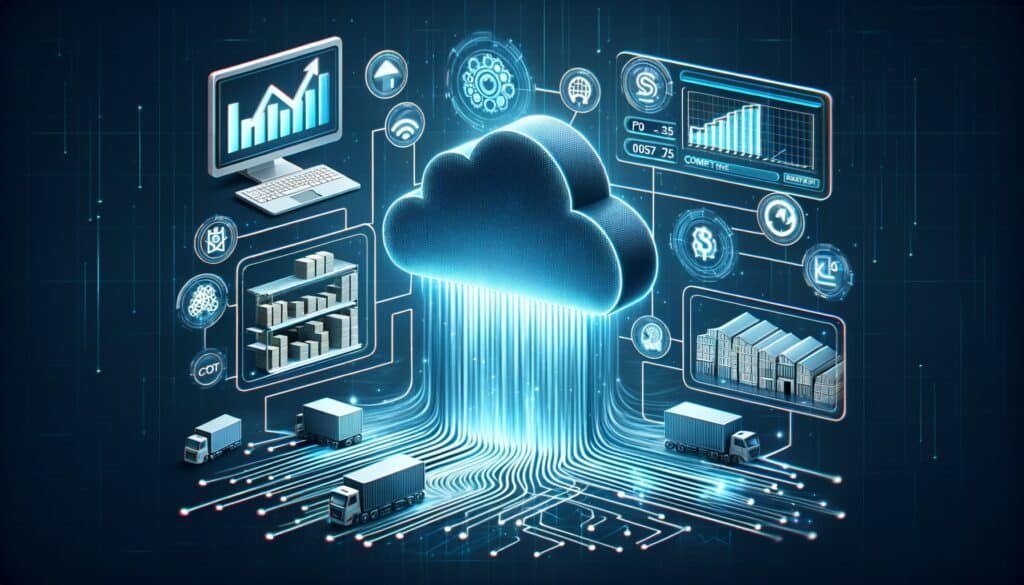
By Harriet Forster December 2, 2024
In today’s fast-paced business environment, efficiency and cost reduction are crucial for the success of any organization. One area where businesses can significantly cut costs is through the implementation of cloud-based Point of Sale (POS) systems. Cloud POS systems have revolutionized the way businesses handle transactions, manage inventory, and streamline operations.
This article will explore the impact of cloud POS systems on reducing operational costs and provide a comprehensive analysis of their benefits.
The Benefits of Cloud Point of Sale (POS) Systems in Streamlining Operations

Cloud POS systems offer numerous benefits that can streamline operations and reduce costs for businesses. One of the key advantages is the ability to access real-time data from anywhere, at any time. Unlike traditional POS systems that require physical servers and on-site maintenance, cloud Point of Sale (POS) systems operate on remote servers, allowing businesses to access their data through the internet. This accessibility enables business owners and managers to monitor sales, inventory, and other crucial metrics in real-time, facilitating informed decision-making and efficient resource allocation.
Another benefit of cloud Point of Sale (POS) systems is their scalability. Traditional POS systems often require expensive hardware upgrades to accommodate business growth. In contrast, cloud POS systems can easily scale up or down based on business needs, eliminating the need for costly hardware investments. This scalability not only saves money but also ensures that businesses can adapt to changing market conditions and customer demands without disruptions.
Furthermore, cloud Point of Sale (POS) systems offer seamless integration with other business tools, such as accounting software, customer relationship management (CRM) systems, and e-commerce platforms. This integration eliminates the need for manual data entry and reduces the risk of errors, saving time and resources. For example, when a sale is made through a cloud Point of Sale (POS) system, the transaction data can automatically sync with the accounting software, updating inventory levels and generating accurate financial reports.
Cost Savings through Cloud POS Systems: A Comprehensive Analysis

Implementing a cloud POS system can result in significant cost savings for businesses. Firstly, cloud POS systems eliminate the need for expensive on-site servers and IT infrastructure. Traditional POS systems require businesses to invest in hardware, such as servers, terminals, and printers, which can be costly to purchase, maintain, and upgrade. In contrast, cloud Point of Sale (POS) systems operate on remote servers maintained by the service provider, reducing hardware costs and the associated maintenance expenses.
Additionally, cloud POS systems offer subscription-based pricing models, allowing businesses to pay for the services they need on a monthly or annual basis. This pay-as-you-go model eliminates the need for large upfront investments and provides businesses with the flexibility to adjust their subscription plans as their needs change. This cost structure is particularly beneficial for small and medium-sized enterprises (SMEs) that may have limited budgets or seasonal fluctuations in sales.
Moreover, cloud POS systems can reduce labor costs by automating manual tasks and streamlining workflows. For example, cloud Point of Sale (POS) systems can automate inventory management, eliminating the need for manual stock counts and reducing the risk of human errors. This automation saves time and allows employees to focus on more value-added tasks, such as customer service and sales.
Additionally, cloud POS systems can generate detailed sales reports and analytics, providing insights into customer behavior and preferences. This data-driven approach enables businesses to optimize their marketing strategies and allocate resources more effectively, resulting in higher sales and reduced costs.
Enhancing Efficiency and Productivity with Cloud POS Systems

Cloud POS systems offer numerous features that enhance efficiency and productivity in businesses. One such feature is the ability to process transactions quickly and accurately. cloud Point of Sale (POS) systems can handle high volumes of transactions simultaneously, reducing waiting times for customers and improving overall customer satisfaction. Moreover, cloud POS systems can accept various payment methods, including credit cards, mobile payments, and online transactions, providing customers with flexibility and convenience.
Furthermore, cloud POS systems can streamline inventory management processes, reducing the time and effort required to track and manage stock levels. With cloud Point of Sale (POS) systems, businesses can set up automatic reorder points, receive real-time notifications for low stock levels, and generate purchase orders with a few clicks. This automation eliminates the need for manual inventory counts and reduces the risk of stockouts or overstocking, resulting in cost savings and improved customer service.
Cloud POS systems also enable businesses to centralize their operations and manage multiple locations from a single platform. This centralized approach allows for consistent pricing, promotions, and inventory management across all locations, reducing the complexity of managing multiple systems and ensuring a seamless customer experience. Additionally, cloud Point of Sale (POS) systems can provide real-time sales data for each location, enabling businesses to identify top-performing stores and allocate resources accordingly.
The Role of Cloud POS Systems in Inventory Management and Cost Control

Effective inventory management is crucial for businesses to control costs and optimize operations. Cloud POS systems play a vital role in inventory management by providing real-time visibility into stock levels, sales trends, and product performance. This visibility allows businesses to make data-driven decisions regarding purchasing, pricing, and promotions, resulting in cost savings and improved profitability.
Cloud Point of Sale (POS) systems enable businesses to set up automatic reorder points based on historical sales data and forecasted demand. When stock levels reach the predetermined threshold, the system can automatically generate purchase orders or send notifications to the purchasing department.
This automation ensures that businesses maintain optimal stock levels, reducing the risk of stockouts or overstocking. By avoiding stockouts, businesses can prevent lost sales and maintain customer satisfaction. Similarly, by minimizing overstocking, businesses can reduce carrying costs, such as storage fees and the risk of obsolescence.
Moreover, cloud POS systems can provide insights into product performance and sales trends. Businesses can analyze sales data by product category, SKU, or location to identify top-selling items, slow-moving inventory, and seasonal trends. This information allows businesses to optimize their product assortment, adjust pricing strategies, and plan promotions effectively. For example, if a particular product is not performing well, businesses can consider discounting or discontinuing it to minimize holding costs and free up shelf space for more profitable items.
Leveraging Data Analytics for Cost Optimization with Cloud POS Systems
Data analytics is a powerful tool that can help businesses optimize costs and improve operational efficiency. Cloud POS systems provide businesses with access to a wealth of sales data, customer information, and transaction details, which can be analyzed to identify cost-saving opportunities and drive informed decision-making.
By leveraging data analytics, businesses can gain insights into customer behavior and preferences. Cloud POS systems can track customer purchase history, demographics, and buying patterns, allowing businesses to segment their customer base and tailor marketing strategies accordingly. For example, businesses can identify high-value customers and offer personalized promotions or loyalty programs to incentivize repeat purchases. By targeting the right customers with the right offers, businesses can increase sales and customer loyalty while minimizing marketing costs.
Data analytics can also help businesses optimize pricing strategies. By analyzing sales data and market trends, businesses can identify price elasticity and determine the optimal price points for their products or services. cloud Point of Sale (POS) systems can generate pricing reports and simulations, allowing businesses to test different pricing scenarios and evaluate their impact on sales and profitability. This data-driven approach ensures that businesses maximize revenue while remaining competitive in the market.
Furthermore, data analytics can assist businesses in demand forecasting and inventory optimization. By analyzing historical sales data and external factors, such as seasonality and market trends, businesses can forecast future demand with greater accuracy. This forecasting enables businesses to optimize inventory levels, reduce carrying costs, and minimize the risk of stockouts or overstocking. By aligning supply with demand, businesses can improve operational efficiency and reduce costs associated with inventory management.
Security and Data Protection: Ensuring Cost-Effective Operations with Cloud POS Systems
Security and data protection are critical considerations when implementing cloud POS systems. Businesses must ensure that their data is secure and protected from unauthorized access or breaches. Cloud Point of Sale (POS) systems employ various security measures to safeguard sensitive information and ensure cost-effective operations.
One of the key security features of cloud POS systems is data encryption. Cloud Point of Sale (POS) systems encrypt data during transmission and storage, making it unreadable to unauthorized individuals. This encryption ensures that customer payment information, personal data, and other sensitive information are protected from potential threats. Additionally, cloud POS systems often employ secure socket layer (SSL) certificates, which establish a secure connection between the user’s device and the cloud server, further enhancing data security.
Cloud POS systems also offer robust user access controls and permissions. Businesses can define user roles and restrict access to sensitive data based on job responsibilities. For example, cashiers may have limited access to sales data, while managers or administrators have broader access to inventory and financial information. By implementing these access controls, businesses can prevent unauthorized access to sensitive data and reduce the risk of internal fraud or data breaches.
Furthermore, cloud Point of Sale (POS) often provide regular data backups and disaster recovery options. In the event of a system failure or data loss, businesses can restore their data from backups, minimizing downtime and ensuring business continuity. These backup and recovery features are crucial for cost-effective operations, as they prevent potential revenue loss and customer dissatisfaction.
Integrating Cloud POS Systems with Other Business Tools for Enhanced Cost Reduction
Integrating cloud Point of Sale (POS) systems with other business tools can further enhance cost reduction and operational efficiency. Cloud POS systems offer seamless integration with various software applications, such as accounting software, CRM systems, and e-commerce platforms, enabling businesses to streamline processes and eliminate manual data entry.
Integration with accounting software is particularly beneficial for cost reduction. Cloud POS systems can automatically sync sales data with the accounting software, eliminating the need for manual data entry and reducing the risk of errors. This automation saves time and resources, as businesses no longer need to reconcile sales data with financial records manually. Additionally, integration with accounting software provides businesses with accurate and up-to-date financial reports, enabling them to make informed decisions regarding budgeting, cash flow management, and cost control.
Integration with CRM systems can also drive cost reduction and customer satisfaction. Cloud POS systems can capture customer information, purchase history, and preferences, which can be synced with the CRM system. This integration allows businesses to personalize customer interactions, offer targeted promotions, and provide exceptional customer service. By understanding customer needs and preferences, businesses can optimize their marketing strategies, reduce customer acquisition costs, and increase customer loyalty.
Furthermore, integration with e-commerce platforms can expand businesses’ reach and drive cost savings. Cloud POS systems can sync inventory levels, pricing, and product information with the e-commerce platform, ensuring consistency across all sales channels. This integration eliminates the need for manual updates and reduces the risk of overselling or underselling. Additionally, cloud Point of Sale (POS) systems can capture online sales data and sync it with the inventory management system, enabling businesses to optimize their stock levels and reduce carrying costs.
FAQs
Q1: What is a cloud POS system?
A cloud POS system is a software-based solution that allows businesses to process transactions, manage inventory, and streamline operations through remote servers accessed via the internet. Unlike traditional POS systems, cloud POS systems eliminate the need for on-site servers and offer real-time data accessibility from anywhere, at any time.
Q2: How can cloud POS systems reduce operational costs?
Cloud POS systems can reduce operational costs in several ways. Firstly, they eliminate the need for expensive on-site servers and IT infrastructure, reducing hardware costs and maintenance expenses. Secondly, cloud Point of Sale (POS) systems offer subscription-based pricing models, allowing businesses to pay for the services they need on a flexible basis.
Thirdly, cloud POS systems automate manual tasks, such as inventory management, reducing labor costs and improving productivity. Lastly, cloud Point of Sale (POS) systems provide data analytics capabilities, enabling businesses to optimize pricing, inventory, and marketing strategies for cost reduction.
Q3: Are cloud POS systems secure?
Yes, cloud POS systems employ various security measures to ensure data protection and secure operations. These measures include data encryption, secure socket layer (SSL) certificates, user access controls, and regular data backups. By implementing these security features, cloud Point of Sale (POS) systems safeguard sensitive information and reduce the risk of unauthorized access or breaches.
Q4: Can cloud POS systems integrate with other business tools?
Yes, cloud POS systems offer seamless integration with various software applications, such as accounting software, CRM systems, and e-commerce platforms. This integration eliminates the need for manual data entry, streamlines processes, and enhances operational efficiency. By integrating with other business tools, cloud POS systems can further enhance cost reduction and improve overall business performance.
Conclusion
Cloud POS systems have revolutionized the way businesses handle transactions, manage inventory, and streamline operations. The benefits of cloud POS systems in reducing operational costs are significant and wide-ranging. By providing real-time data accessibility, scalability, and seamless integration with other business tools, cloud POS systems enhance efficiency, productivity, and cost savings.
Through automation, data analytics, and enhanced security measures, businesses can optimize inventory management, pricing strategies, and customer interactions, resulting in improved profitability and customer satisfaction. As businesses continue to embrace digital transformation, cloud POS systems will play an increasingly vital role in reducing operational costs and driving sustainable growth.